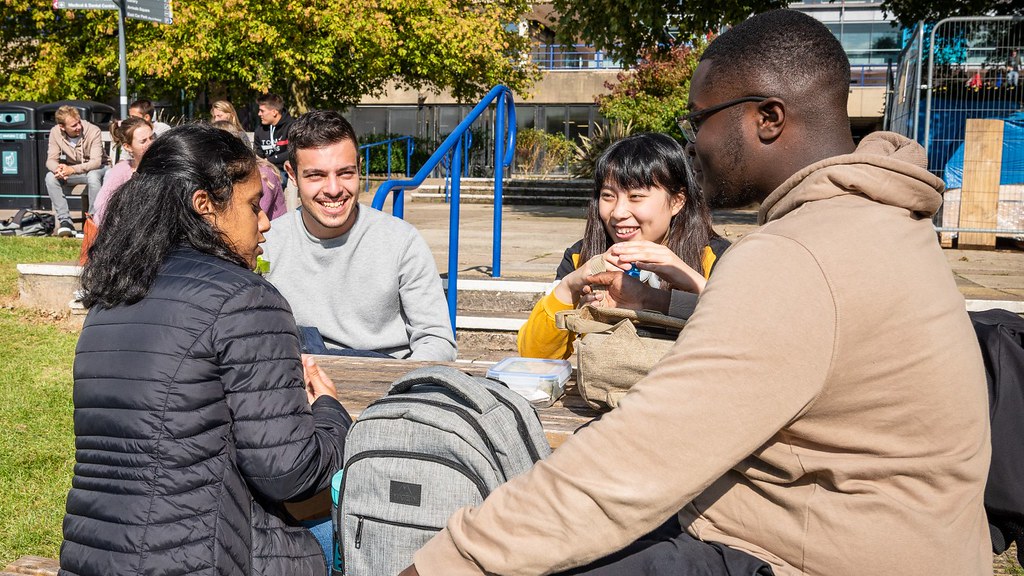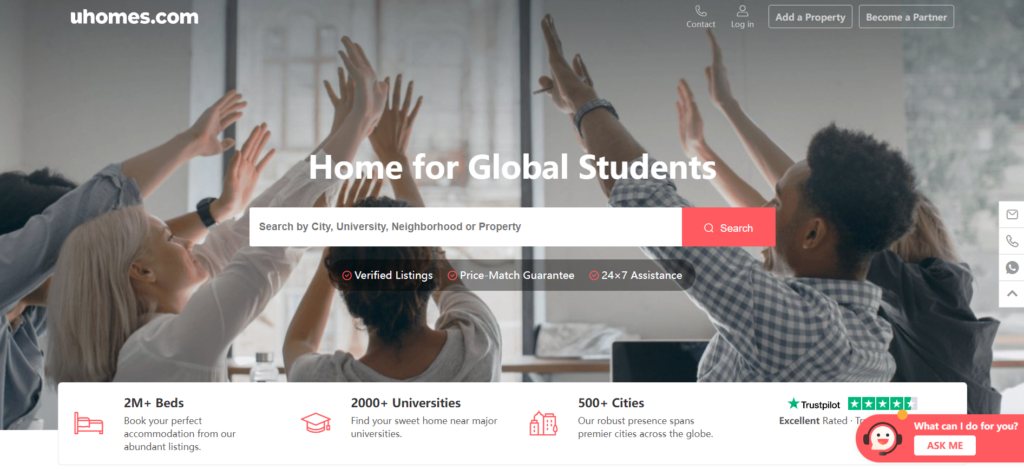Receiving an offer from a UK university signifies that you’re one step closer to pursuing your dreams. However, it can also be a time of uncertainty as you navigate the next steps. In this blog post, we’ll guide you through the essential actions to take after receiving an offer from a UK university, ensuring that you are well-prepared for the next chapter of your education.
If you’re thinking about studying in the UK, it’s crucial to find the right student accommodation. That’s where uhomes comes in. It’s a reliable platform that helps students like you find the perfect place to live. They have partnered with over 2,900 educational institutions and offer rental options recommended by these schools to over 200,000 students studying abroad. So far, they’ve helped more than 55,000 students successfully find their dream homes.

Check the Key Information on the Offer Letter
Getting an offer letter from a UK university is super exciting! But before you start celebrating, it’s a good idea to go through the offer letter and make sure you’ve got all the important info. There are some key details you should double-check, so you can smoothly transition into your university adventure.
✅Acceptance Deadline
- Make sure you find out the deadline for accepting the offer.
- It’s crucial to meet this deadline and secure your spot at the university.
- Mark the acceptance deadline on your calendar or set a reminder so you don’t forget.
✅Offer Conditions
- Take a close look at any conditions mentioned in the offer letter.
- Understand what’s expected of you, like achieving certain grades or submitting specific documents.
- If anything seems unclear, don’t hesitate to reach out to the admissions office for clarification.
✅Tuition Fees and Payment Details
- Find the part that talks about tuition fees in the offer letter.
- Make sure you understand when and how you need to pay.
- If you have any questions about payments, you can contact the university’s finance department or check their website for more details.
✅Accommodation Options
- Look for information about accommodation in the offer letter.
- See if they mention on-campus housing or provide guidance for finding off-campus housing options.
- Note any deadlines or steps you need to take to secure accommodation.
✅Contact Information
- Find and jot down the contact details of the admissions office or any other important contacts.
- It’s handy to have this info in case you need to reach out with any questions or concerns.

Choose Between Several Offers
If you find yourself in the fortunate position of having received multiple offers from UK universities, you have an exciting decision ahead of you. But it can also feel overwhelming to choose just one from the options available. Regarding the decision-making process to choose the right school, it’s important to carefully consider a few key factors.
✏️Evaluate Your Options
- Take the time to carefully review each offer, including the courses, modules, and overall program structure.
- Consider the reputation and ranking of the universities, as well as the specific department or faculty offering your desired course.
- Think about the location, campus facilities, and the overall student experience offered by each institution.
We hope the following posts will provide you with valuable information about the different types of universities in the UK and their rankings:
✏️Prioritize Your Preferences
- Identify your priorities and rank them accordingly. These may include factors such as location, course content, university reputation, available resources, or opportunities for research or internships.
- Consider your long-term goals and how each university aligns with your aspirations.
- Reflect on the learning environment and the support services provided to students, such as career guidance or mentorship programs.
✏️Consider Financial Factors
- Assess the financial implications of each offer, including tuition fees, scholarships, bursaries, and the cost of living in different locations.
- Evaluate the potential for part-time work opportunities or any financial support programs offered by the universities.
✏️Visit Open Days or Virtual Tours
- Whenever possible, attend in-person open days or virtual tours offered by the universities.
- This provides an opportunity to explore the campuses, interact with faculty and current students, and get a feel for the university atmosphere.
- Take note of how comfortable you are with the campus and the overall vibe of each institution.
✏️Seek Advice and Gather Information
- Reach out to current students or alumni of the universities you’re considering.
- Engage in forums, social media groups, or online communities to gather firsthand insights and experiences.
- Consult with teachers, mentors, or academic advisors who can provide guidance based on your academic and career goals.

Look for Accommodation and Living Arrangements
Securing suitable accommodation is a crucial aspect of your university journey. Here’s some tips to help you find the right living arrangements.
🐌Secure Accommodation Early
- If the university provides on-campus housing, it’s advisable to secure your spot early.
- On-campus accommodation often provides convenience, proximity to campus facilities, and a supportive community.
- Due to limited availability, early application increases your chances of getting your preferred housing option.
🐌Find Off-Campus Options
- If on-campus housing isn’t available or doesn’t meet your needs, you’ll need to explore off-campus options.
- Start your search early to have ample time to find suitable accommodation.
- Utilize online platforms (uhomes.com is a good one), university notice boards, and local rental websites to find listings for flats, apartments, or shared houses.

🐌Consider Location, Facilities, and Budget
- When evaluating accommodation options, consider factors such as location, proximity to campus, public transportation, and local amenities like grocery stores and healthcare facilities.
- Assess the facilities provided, such as laundry, communal spaces, and internet connectivity.
- Determine your budget and ensure the rent, utilities, and other expenses align with your financial situation.
🐌Seek Peer Recommendations
- Talk to current students or join student forums to gather insights on popular off-campus areas and recommended accommodation options.
- Peer recommendations can provide valuable information about the quality of housing, affordability, and the overall student experience in different areas.
Prepare Documentation and Visa Process
When planning to study in the UK, it’s important to understand the necessary documentation and visa process. Here’s an overview to help you navigate through this crucial aspect.
📝Required Documentation
- Valid Passport: Ensure your passport is valid for the duration of your stay in the UK.
- Acceptance Letter: You’ll need the official acceptance letter from the university you plan to attend.
- Confirmation of Acceptance for Studies (CAS): This is a unique reference number issued by the university, which you’ll need for your visa application.
- Financial Proof: Prepare evidence showing that you have sufficient funds to cover tuition fees and living expenses in the UK. This could include bank statements, scholarship letters, or financial sponsorship documents.
- English Language Proficiency: Provide proof of your English language proficiency, such as IELTS or TOEFL scores, if required.
- Tuberculosis (TB) Test: Depending on your home country, you may need to undergo a TB test and provide the necessary documentation.


📝Visa Application Process
- Tier 4 (General) Student Visa: Most international students will need to apply for a Tier 4 (General) Student Visa.
- Apply Online: Submit your visa application online through the UK government’s official website.
- Pay Fees: Pay the visa application fee and the Immigration Health Surcharge (IHS) fee, which covers access to the National Health Service (NHS) during your stay.
- Biometrics Appointment: Book an appointment to provide your biometric information, including fingerprints and a photograph, at a visa application center. (How to Get the BRP Card in the UK?)
- Supporting Documents: Prepare and submit all required documents, including the CAS, financial proof, and other supporting materials.
- Visa Decision: The UK Visas and Immigration (UKVI) will review your application and make a decision. This process can take several weeks, so it’s important to apply well in advance of your intended start date.
📝Important Deadlines
- Be aware of any application deadlines set by the university and the visa processing times.
- It’s recommended to start the visa application process as soon as you receive your CAS, ideally three months before your intended travel date.
- Allow sufficient time for document gathering, appointment booking, and any potential delays in the visa processing.
📝Seek Guidance
- Reach out to the international student support services at your chosen university for guidance and assistance throughout the visa application process.
- They can provide detailed information, answer your questions, and offer support with any challenges you may encounter.
- Additionally, consult the official website of the UK government’s Home Office or contact the nearest UK embassy or consulate for accurate and up-to-date information.

Connect with Future Peers and the University
Building connections with your future peers and the university community is not only an essential part of your university experience but also a key aspect of personal and academic growth. To help you make the most of this valuable opportunity, here are some suggestions to proactively connect and engage with others.
😊Online Communities and Social Media
- Join online communities, social media groups, or forums dedicated to students attending the same university or studying similar programs.
- These platforms provide an opportunity to ask questions, share experiences, and connect with fellow students even before arriving on campus.
- Participate actively, engage in discussions, and contribute to the community to foster meaningful connections.
😊Attend University Events and Orientations
- Take advantage of university events, orientations, or pre-arrival webinars organized by the university.
- These events offer valuable information about campus life, academic expectations, and support services.
- Attending such events allows you to meet other incoming students, ask questions, and familiarize yourself with the university’s resources and facilities.
😊Engage in Student Organizations and Clubs
- Explore the various student organizations, clubs, and societies available at the university.
- These groups cater to a wide range of interests, hobbies, and academic disciplines.
- Joining a club or organization related to your interests not only helps you connect with peers but also provides opportunities for personal growth, leadership development, and networking.
Conclusion
Receiving an offer from a UK university is just the beginning of an incredible adventure. By following the steps outlined in this blog post, you’ll be equipped with the knowledge and resources to make informed decisions, secure suitable accommodation, understand the visa process, connect with future peers, and engage with the university community. Embrace the journey ahead, and congratulations once again on your acceptance. Your future as a UK university student awaits!
FAQ
An offer letter is a formal document issued by a UK university to inform you that you have been offered a place in a specific program of study. It outlines the terms of your offer, including the course details, start date, any conditions you must meet, and other relevant information.
The time it takes to receive an offer letter can vary depending on the university and program. In general, it can take a few weeks to a couple of months from the time you submit your application. However, some universities may provide a quicker response, especially if you have applied through a fast-track or rolling admission process.
A conditional offer means that you have been accepted, but you must meet certain conditions before you can fully secure your place. These conditions could include achieving specific grades in your current studies or completing certain courses. Ensure that you understand and fulfill the conditions outlined in the offer letter to progress to an unconditional offer.







